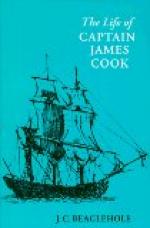Lieutenant Clerke, who was very friendly with Banks, wrote to him on 31st May:
“Indeed I am sorry I’m not to have the honour of attending you the other bout...They are going to stow the major part of the cables in the hold to make room for the people now. I asked Gilbert [the Master], if such was the present case, what the devil should we have done if we had all gone? ‘Oh, by God, that was impossible,’ was his answer.”
Marra (the gunner’s mate), in a Journal of the voyage, published by Newberry, 1775, says the success of the voyage was due to their having shaken off:
“the train of gentlemen, who with their attendants occupied the chief accommodations of the ship,” and whose presence would have rendered it “out of the power of the most determined officer to have carried such a princely retinue through the icy regions which they were to pass, without murmurs, or perhaps mutiny.”
Some of the newspapers tried to make political matter out of the affair, and one at any rate roundly declared that “the true reason” of Banks’s withdrawal was on account of a remonstrance from the Spanish Ambassador against any further exploration of the South Seas.
The withdrawal of Banks made no difference to his friendship with Cook, and in the future he was always ready to afford his support whenever it could be of any service either to his friend or family.
John Reinhold Forster.
As soon as it was known that Mr. Banks had withdrawn, Mr. John Reinhold Forster, a German of some scientific reputation, applied for the position of naturalist for the voyage, and, through the interest of Lord Sandwich, was successful. He was to receive the 4000 pounds granted by Parliament for Dr. Lynd, and was to pay all expenses, except ship’s allowance of food, and provide all necessary instruments. He was accompanied by his son as assistant, a youth of about twenty years, who afterwards attained some note by his writings and translations. Messrs. Wales and Bayley were appointed astronomers by the Board of Longitude, with instructions to take and compare observations at every possible opportunity, and to take under their special charge the timepieces which were being carried on the two ships for the purpose of testing their accuracy and capabilities in assisting in ascertaining the longitude. Two of these instruments, made by Arnold, were placed in Mr. Bayley’s charge on the Adventure, and two, one by Arnold, and the




